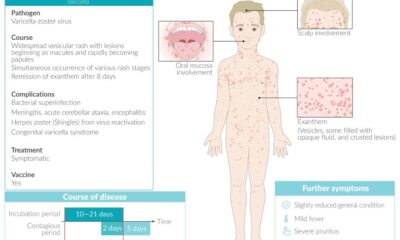#TurksandCaicos#Measles, February 15th 2024 – The Ministry of Health and Human Services wishes to advise the public to remain alert for the signs and symptoms of measles. While there are no cases of measles in the Turks and Caicos, we are still in the winter tourist season and during this time, it is easy for measles to be imported from other regions which still have very high incidences of cases. Reports of January 24th 2024 reveals that the Region of the Americas had reported over twenty-nine (29) cases of Measles in four countries, twenty-eight (28) of these cases were imported from other regions.
Measles is a highly infectious disease which is accompanied by a rash with fever and at least one of the following three symptoms: coryza (runny nose), cough and conjunctivitis (red eyes). The rash starts behind the ears and then spreads to the head and neck, followed by the rest of the body. Other symptoms include small greyish white spots with a bluish-white center inside the mouth, cheek and throat and body aches. Measles is spread through droplets in the air which are generated by the coughs and sneezes of infected persons. Measles virus can live for up to two hours in the air where the infected person coughed or sneezed. If other people breathe the contaminated air or touch the infected surface, then touch their eyes, noses, or mouths, they can become infected. Measles is so contagious that if one person has it, up to 90% of the people close to that person who are not immune will also become infected. The period when a person is infectious and can spread the virus is within 7 to 10 days of exposure but can be up to 14 days.
Most measles-related deaths are caused by complications associated with the disease and serious complications are more common in children under the age of 5, or adults over the age of 30. The most serious complications include blindness, encephalitis (an infection that causes brain swelling), severe diarrhoea and related dehydration, ear infections, or severe respiratory infections such as pneumonia. Severe measles is more likely among individuals whose immune systems have been weakened. Women infected while pregnant are also at risk of severe complications and the pregnancy may end in miscarriage or preterm delivery. People who recover from measles are immune for the rest of their lives.
Unvaccinated young children are at highest risk of measles and its complications, including death. Unvaccinated pregnant women are also at risk. Any non-immune person (who has not been vaccinated or was vaccinated but did not develop immunity) can become infected.
No specific antiviral treatment exists for measles virus.
Severe complications from measles can be avoided through supportive care that ensures good nutrition, adequate fluid intake and treatment of dehydration with WHO-recommended oral rehydration solution. This solution replaces fluids and other essential elements that are lost through diarrhoea or vomiting. Antibiotics should be prescribed to treat eye and ear infections, and pneumonia.
The number one way of preventing measles is through vaccination with the Measles, Mumps, Rubella (MMR) vaccine. The measles vaccine has been in use for over 50 years. It is safe and highly effective. It is offered free of cost at all primary health care facilities within the Turks and Caicos Islands.
The Turks and Caicos Islands has maintained high immunization coverage, over 90%, in the MMR vaccine. The last reported case of measles in the TCI was in 1991. Although, we have good immunity in the TCI, persons who are not protected are at an increased risk of contracting the virus. This includes persons who have never been vaccinated and those who have not completed their 2-dose schedule. The TCI welcomes over one million visitors annually from all over the world; this creates a risk for importation and re-introduction of measles into the country.
To be considered fully protected against measles, individuals must have two doses of the MMR vaccine. The TCI offers this at ages 1 and 2 years. Parents who are uncertain about their child’s immunization status should bring their take-home vaccine cards into any primary care clinic to have it checked. Persons who are uncertain of their immunization status may also visit the clinic to determine their status and be vaccinated if necessary. If you are concerned that you might have been exposed, please contact your health care provider. Measles vaccines protect both you and the wider community.
For more information, please contact the Primary Health Care Department Public Health Nurses on the following telephone numbers: 338-5474; 338-5470 or 946-5613 or, you may contact your local health care provider.
Keep up to date by checking the Ministry of Health’s Facebook page on https://www.facebook.com/tcihealthpromotions.
Help us keep TCI measles free, protect yourself and your loved ones from measles!


 Caribbean News7 days ago
Caribbean News7 days ago
 Caribbean News7 days ago
Caribbean News7 days ago
 Caribbean News1 week ago
Caribbean News1 week ago
 Caribbean News7 days ago
Caribbean News7 days ago
 Bahamas News7 days ago
Bahamas News7 days ago
 News7 days ago
News7 days ago
 Bahamas News1 week ago
Bahamas News1 week ago
 News7 days ago
News7 days ago






















